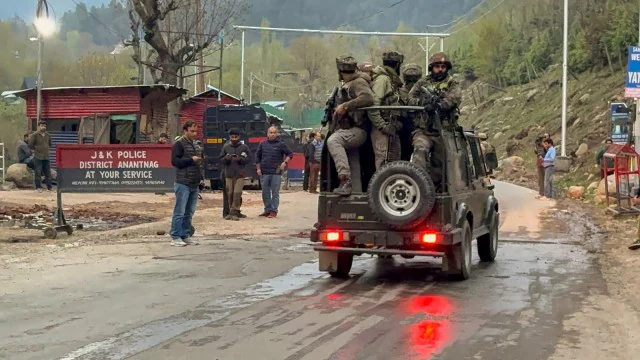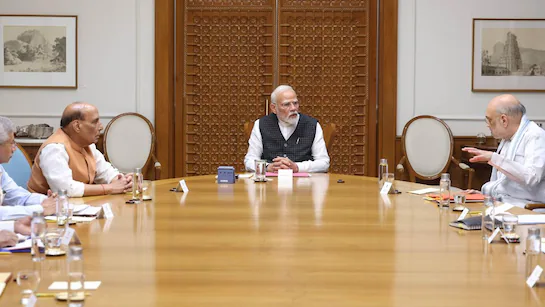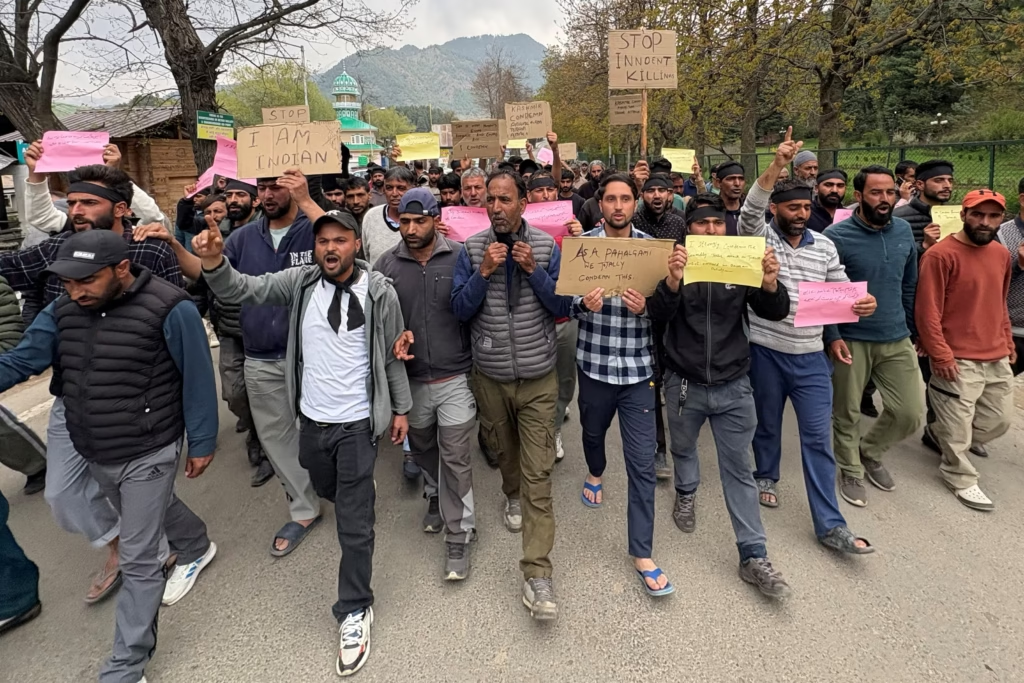🌄 A Valley of Dreams Turned Into a Nightmare
For generations, the breathtaking valleys of Kashmir have been painted in poetry, celebrated in cinema, and craved by wanderers from across the globe. The meadows of Pahalgam, in particular, with their wildflowers and snow-dusted peaks, have long been a sanctuary of serenity.
But on the morning of April 22, 2025, that peace was shattered. The hills echoed not with laughter or the rustle of wind through pines — but with screams, gunfire, and bloodshed.
Twenty-six innocent lives were brutally snatched away in what’s now being called the deadliest terrorist in Kashmir attack in over a decade. This wasn’t just an act of violence — it was a wound carved into the heart of a nation.
Table of Contents
📍 The Attack: Timeline of a Tragedy
It began as an ordinary day.
More than 100 tourists, mostly families from Mumbai, Delhi, and Bengaluru, had set off on pony rides toward Baisaran, a picturesque high-altitude meadow. The weather was perfect — cool, sunny, and full of promise.
Around 9:34 a.m., as the group neared a narrow gorge known as “Shepherd’s Bend,” masked gunmen ambushed them from both sides.
According to initial forensic analysis:
- The attackers used M4 carbines and Chinese-made grenades.
- The entire ambush lasted 13 minutes.
- A total of 87 rounds were fired.
- Explosives had been planted in advance to block exits.
“It was like watching a horror film unfold in real life,” said Anjali Mehta, a survivor who lost her 12-year-old daughter in the attack.
Helicopters couldn’t reach the site immediately due to the terrain. By the time special forces arrived, the attackers had vanished into the forest.

🕵️ Who Was Behind It?
A terrorist organization calling itself Lashkar-e-Haqq (LEH) claimed responsibility via a Telegram channel within hours. Though previously unheard of, the group is suspected to be a proxy arm of the banned Lashkar-e-Taiba, experts say — possibly formed to evade international sanctions.
Indian intelligence has drawn early links to ISI-backed training camps in Pakistan-occupied Kashmir (PoK), based on satellite surveillance, phone intercepts, and recovered gear.
“This wasn’t just terror — this was theatre,” said Vikram Dua, a counterterrorism analyst. “They wanted to shock, scar, and destabilize.”
Several security officers believe the goal was not just to kill, but to destroy the illusion of safety that India has worked hard to build around Kashmir tourism.
🔥 Political Firestorm
The massacre has triggered an explosive diplomatic crisis.
India’s Response:
- Prime Minister Narendra Modi declared a 48-hour national mourning.
- He promised “relentless pursuit” of the perpetrators.
- Operation Rakshak 2.0 was launched, involving air surveillance, infantry movements, and drone warfare.
In his statement to Parliament, PM Modi said:
“This was not just an attack on tourists. It was an attack on our collective conscience. There will be consequences.”

Pakistan’s Denial:
The Pakistani Foreign Ministry swiftly condemned the attack but denied any involvement, calling it “an Indian attempt to malign Pakistan.” This sparked outrage in Indian media, with several anchors calling the denial “cowardly and complicit.”
Tensions along the Line of Control (LoC) have since escalated, with cross-border shelling reported in Kupwara, Uri, and Poonch.
🕯️ The Human Cost
Behind every number is a name, a face, a shattered family. The massacre claimed:
- A newlywed couple from Andheri on their honeymoon.
- A group of school children on a field trip.
- A retired teacher, traveling with her three daughters.
One of the most heartbreaking stories was that of 9-year-old Neha Verma, who used her smartwatch to call for help while hiding under her mother’s blood-soaked shawl.
“She stayed silent for an hour, texting coordinates to a local guide. That girl saved 12 lives,” said local rescue worker Wasim Khan.
💐 Faces We Lost
There are just a few of the 24 souls we must remember:
| Name | Age | Hometown |
|---|---|---|
| Rajiv Khurana | 38 | Mumbai |
| Savita Devi | 61 | Lucknow |
| Prateek Bansal | 28 | Bengaluru |
| Neelima Reddy | 32 | Hyderabad |
“This was our first family trip in ten years,” said a sobbing uncle from Neelima’s family. “Now it will be our last memory of her.”

🧠 Psychological & Cultural Fallout
The massacre has sparked a national trauma.
- Social media has turned into a battlefield, with hashtags like
#JusticeForTourists,#BanPakistan, and#KashmirBleedsAgain. - Fear is surging. Travel cancellations have jumped by 74% in Srinagar, Gulmarg, and Pahalgam.
- Kashmiri civilians, especially Muslims, have reported backlash and hate crimes outside the region.
Mental health professionals warn of a second wave of suffering — in the form of PTSD, survivor’s guilt, and collective anxiety.
“Terrorists aim to break our spirit. We must not let them,” said Dr. Samira Rizvi, a trauma psychologist.
🌍 Global Reaction
The international response has been unusually sharp:
- UN Secretary-General António Guterres: “This is an unforgivable act of mass murder.”
- U.S. President Emilia Reyes condemned the attack and offered counterterrorism support.
- France, Australia, and Japan have issued travel advisories against Kashmir.
Even Pakistan’s own civil society groups, including the Human Rights Commission of Pakistan, expressed “solidarity with Indian victims.”
🎯 Security Shake-Up
In the wake of the attack, India is revamping national security:
- Increased surveillance along tourist routes.
- Facial recognition systems to be installed in popular Kashmir locations.
- Drone patrols now fly over Pahalgam valley 24/7.
- The central government is pushing for a nationwide anti-terror database for better intelligence sharing.
The Ministry of Home Affairs is also considering invoking “Internal Security Emergency Powers,” a rare constitutional move.
🧭 Stories of Courage
Even in horror, there were heroes:
- Wasim Dar, a pony handler, ran back into the attack zone three times to pull out survivors.
- Ravi Malhotra, a former army medic on holiday, used napkins and belts to stop bleeding and saved six lives.
- Nuns from a nearby convent opened their doors to survivors and offered shelter without question.
“We lost many, but we didn’t lose our humanity,” said Dar, who was later honored by the Governor.
🔍 Root of the Problem
Why Kashmir? Why tourists?
According to terrorism analysts, the attack was highly strategic:
- Tourism in Kashmir had seen a boom, reaching pre-2019 levels for the first time.
- This was seen by separatist groups as a symbol of “normalization” they want to disrupt.
- Attacking tourists aims to cripple Kashmir’s economy and undermine India’s image globally.
💔 Kashmir’s Cry
Not all Kashmiris are silent or complicit. In fact, many locals have come out in mourning and protest, forming human chains, holding interfaith prayers, and raising funds for victims’ families.
“We are Kashmiris. We are not terrorists. These killers are enemies of all of us,” said Imam Yusuf of Srinagar’s Hazratbal Mosque.
Their voices offer hope that unity can still defeat division.
📢 What Needs to Be Done?
India’s counterterrorism policy is now under national scrutiny. Experts recommend:
- Deeper coordination between intelligence agencies.
- Tech-enabled surveillance, especially for high-risk zones.
- Youth rehabilitation programs to prevent radicalization in the Valley.
- International pressure on countries that harbor or fund terrorism.
- Community-based resilience efforts to prevent communal backlash.
But beyond policies, what India needs most is unity without hate. Strength without cruelty. Justice without vengeance.
🧷 Final Thoughts: A Nation in Mourning, But Not Broken
The Pahalgam massacre has devastated India. It has left behind ashes of memories, rivers of tears, and scars that will take generations to fade.
Yet amidst the pain, the resolve is palpable. India is wounded, yes — but not defeated. Terror has stolen lives, but it cannot steal our spirit.
“We will remember. We will rebuild. And we will rise.”
Website References: The Times UK – Tensions in Kashmir , Reuters: Kashmir Conflict Escalates, The Washington Post – April 2025
For more such content follow Taza Content